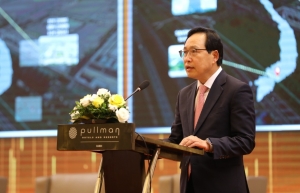Vietnam's market becomes ray of hope for South Korean semiconductor manufacturers
 |
According to a recent report by the Bank of Korea (BOK), Vietnam is swiftly becoming a significant market for South Korean semiconductor makers, who have been grappling with lacklustre demand in China.
As the rivalry between the United States and China intensifies, the BOK has emphasised the importance of diversifying export markets for industry giants like Samsung Electronics and SK Hynix.
The BOK underlines Vietnam's emergence as a new source of demand for South Korean semiconductors, highlighting its growing status as an international hub for IT device production and potentially positioning it as a substitute for China in the future.
Major smartphone manufacturers have established production bases in Vietnam, where South Korean semiconductors play a crucial role as intermediary goods in the production of finished products, the report notes.
Vietnam's abundant low-wage workforce and its proximity to the Chinese market are attracting global businesses, including South Korean firms, to establish manufacturing facilities in the Southeast Asian nation.
Samsung Electronics, for instance, relocated its smartphone and computer production bases to Vietnam between 2018 and 2020. Similarly, Apple shifted parts of its iPad production lines from China to Vietnam in June last year, and Google is reportedly considering a similar move.
At the VIR conference Stronger Investment Partnerships for a Thriving Vietnam in mid-May, CEO of Samsung Vietnam Choi Joo Ho highlighted, "At present, more than half of all Samsung smartphones selling around the world are made in Vietnam. The nation has grown significantly to become a key player in the production of mobile phones globally."
"IT businesses around the world are seriously watching Vietnam, acknowledging it as a manufacturing hub for mobile phones," he added
The BOK believes that the revival of Vietnam's economy presents another encouraging factor. Although the country experienced a slowdown during the lockdown period, it rebounded strongly and achieved an impressive 8 per cent growth last year. Moreover, Vietnam recorded the largest trade surplus for South Korea in 2022.
As of 2022, China accounted for 55 per cent of South Korea's semiconductor exports, followed by Vietnam at 12 per cent, Taiwan at 9 per cent, and the United States at 7 per cent. However, the US experienced the most significant decline in export demand in April this year compared to the same month in 2022, plummeting by 68.6 per cent.
Nevertheless, the BOK predicts that South Korea's semiconductor market will remain heavily influenced by China and the US due to its strong reliance on these key markets. The market shares of South Korean semiconductor manufacturers are expected to be determined by an increase in Chinese smartphone consumption and a recovery in US data centre investments.
In light of the semiconductor market's inherent volatility, the report emphasises the need to reduce market fluctuations by enhancing competitiveness in the non-memory chip sector and diversifying sources of demand. Strategic responses are also deemed essential to mitigate the negative impact resulting from conflicts between the United States and China, which represent the largest proportion of domestic semiconductor demand.
According Koreatimes, as Vietnam's stature as a hub for IT device production continues to rise and its economy shows remarkable resilience, South Korean semiconductor manufacturers are finding solace in this promising market. While challenges persist, the strategic decisions made by these industry players will be vital in shaping their future success amidst evolving geopolitical dynamics and shifting global demand.
| US semiconductor manufacturers survey Vietnam opportunities Vietnam was one of the destinations for US semiconductor manufacturers to survey in a recent fact-finding tour of Southeast Asia. |
| Capitalising on semiconductor market Among the ASEAN nations, Vietnam possesses unique value propositions to attract semiconductor investment. Timothy Wong, leader for Southeast Asia Industrial Practice, and Dr. Michael Alexander, founder at the Advanced Technology Centre for Roland Berger, analyse Vietnam’s position in semiconductor manufacturing, as well as its advantages and disadvantages. |
 | Samsung Vietnam CEO drives sustainable development At the conference Stronger Investment Partnerships for a Thriving Vietnam organised by VIR on the morning of May 15, Samsung was noted as one of the nation's most successful foreign-invested enterprises. |
What the stars mean:
★ Poor ★ ★ Promising ★★★ Good ★★★★ Very good ★★★★★ Exceptional
 Tag:
Tag:
Related Contents
Latest News
More News
- Vietnam remains spiritual support for progressive forces: Colombian party leader (January 21, 2026 | 08:00)
- 14th National Party Congress’s opening: Great aspirations, steady steps (January 20, 2026 | 09:50)
- Opening remarks of 14th National Party Congress (January 20, 2026 | 09:44)
- First working day of 14th National Congress of Communist Party of Vietnam (January 19, 2026 | 08:54)
- Viettel starts construction of semiconductor chip production plant (January 16, 2026 | 21:30)
- Redefining Vietnam’s growth model for the era of innovation (January 16, 2026 | 16:40)
- Foreign sentiment towards Vietnam turns more positive (January 15, 2026 | 11:08)
- Vietnam ranks 38th in global AI adoption (January 14, 2026 | 16:01)
- European business confidence reaches highest in seven years (January 13, 2026 | 10:17)
- UOB lifts Vietnam growth outlook to 7.5 per cent for 2026 (January 10, 2026 | 09:00)



















 Mobile Version
Mobile Version